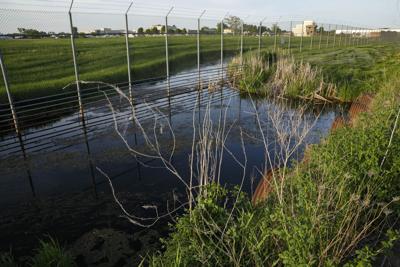Lawmakers sent Gov. Tony Evers a bill Thursday they say will help Wisconsin residents plagued by a class of potentially toxic chemicals, but the governor has said the bill as written actually shields polluters from accountability.
PFAS, or per- and polyfluoroalkyl substances, have been used for years in a range of products from firefighting foams to non-stick pans and made their way into the groundwater of dozens of Wisconsin communities, including Madison.
While scientists are still researching the full health effects of the chemicals, PFAS are believed to potentially cause cancer, high cholesterol and other medical problems.
In the 2023 state budget, lawmakers approved allocating $125 million to help local governments and private landowners address PFAS but didn’t lay out a blueprint for how the money should be spent.
Evers' administration submitted a plan to use the money, but Republicans have instead favored moving forward with legislation authored by two GOP senators from Green Bay — Robert Cowles and Eric Wimberger. The measure doesn't directly spend the money but instead creates programs that the $125 million could eventually fund.
The measure, which passed the Assembly Thursday on a party-line vote, would create a grant program for “innocent landowners” who have PFAS contamination on their property, support local governments in testing for PFAS and improving their local water systems, and help landowners build new wells.
But language in the bill largely prevents the state Department of Natural Resources from taking enforcement action against participants in the “innocent landowner” program.
Environmental advocates and Evers argue the definition of landowner is broad enough to include entities that might have caused spills in the first place.
The bill also bars the DNR from requiring grant recipients to address PFAS unless the levels exceed state or federal standards. The DNR also must get landowner approval for conducting testing on their property, unless the land is owned by the state.
Evers said lawmakers have “moved forward without making the necessary changes in SB 312 ... to earn my support" and argued the Joint Finance Committee could release the money at any point without the bill.
“It is unfortunate that preventing polluters from being held accountable continues to be a legislative priority rather than getting resources to impacted communities to remove PFAS and other contaminants from Wisconsinites’ wells and taps,” Evers wrote in a letter, dated Feb. 21, to Cowles and Wimberger.
Rep. Katrina Shankland, D-Stevens Point, said it was frustrating that negotiations among her office, the DNR and the bill's supporters ultimately broke down.
"When it came down to getting money out the door versus hindering the DNR, I was told by my colleagues that they’d rather just take a veto because they didn’t want to lose out on an opportunity to undermine the DNR," Shankland said on the Assembly floor.
Proponents have argued the language is merely designed to ensure those who didn't cause the PFAS contamination wouldn't be targeted by an enforcement action.
Rep. Jeffrey Mursau, R-Crivitz, who authored the Assembly version of the bill, argued that a farmer whose PFAS-contaminated water flows to a neighbor's property shouldn't be held responsible as an emitter if the farm wasn't the original source of the chemicals.
"That's the whole crux of this whole bill, is trying to get stuff cleaned up without making somebody liable that had nothing to do with it," Mursau said at a press conference Thursday.
Supporters urged Evers to change his mind and sign the bill.
Rep. Rob Swearingen, R-Rhinelander, pointed to the example of the town of Stella in his district, where residents are drinking bottled water to avoid PFAS contamination, potentially from sludge generated by a nearby paper mill and spread on potato fields.
"SB 312 is not perfect," Swearingen said on the Assembly floor. "One hundred twenty-five million dollars is obviously not going to be enough, but it is going to be a good start."
If passed and signed into law, budget writers on the Joint Committee on Finance would still need to formally approve the use of the $125 million.
The state Natural Resources Board voted to move forward last year with a process to develop limits on PFAS concentration in groundwater. The board has passed regulations for drinking and surface water standards.
The groundwater standards have raised concerns from businesses and some Republican legislators, who argue the rules would harm commerce. Affected communities say the contamination limits are an important way of keeping private well owners safe.
The DNR held public hearings on the proposed groundwater rules earlier this fall. But they ultimately had to stop the rulemaking process because of an existing state law, which is designed to give the Legislature a greater role when agencies develop rules and regulations.
Under that measure, legislators would need to sign off on any rule that is expected to cost businesses, local governments and individuals more than $10 million over a two-year period. The groundwater standards would meet that requirement.
Cowles and Wimberger have introduced a measure to allow the rulemaking process to move forward, although that idea is unlikely to pass this legislative session. Top lawmakers have said Thursday is the final day of Capitol floor work for the state Assembly.
Evers had previously called on legislators to move more expeditiously to allow the DNR to move forward with the rulemaking process.
Lawmakers rejected an amendment from Shankland and Rep. Jill Billings, D-La Crosse, that would have provided an exemption to allow the rulemaking process to move forward.
"You may think $10 million is a high standard but the health hazards that come along with PFAS far, far outpace that," Billings said.






